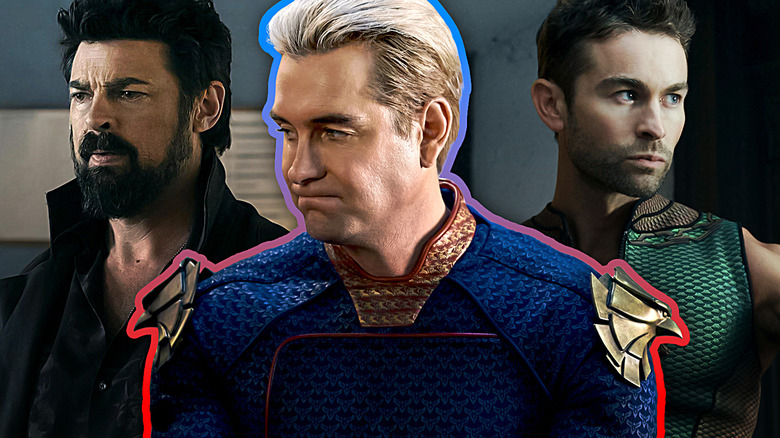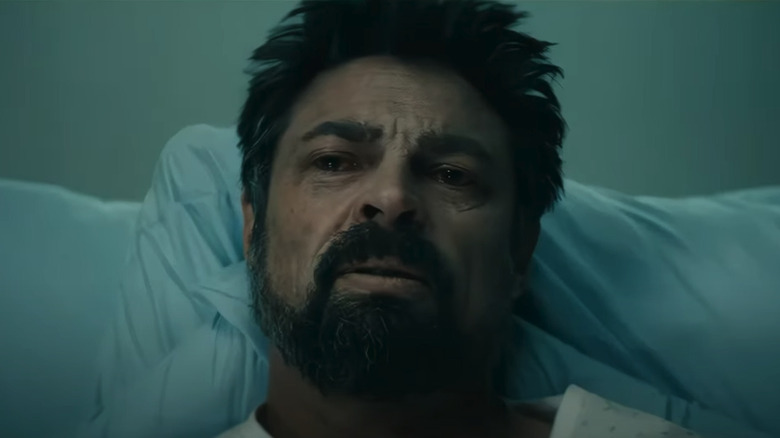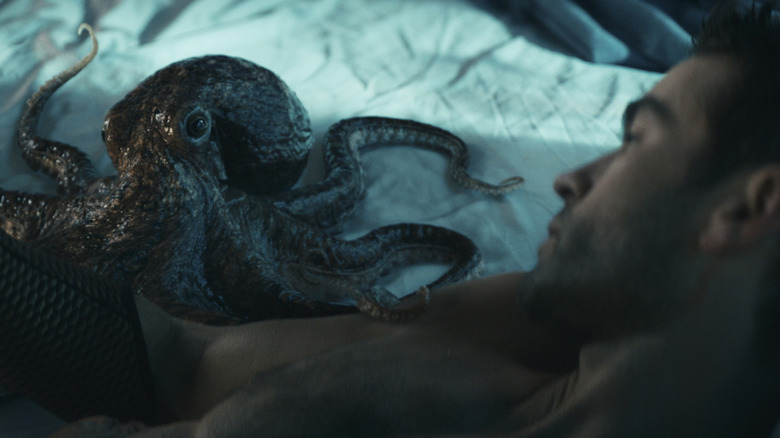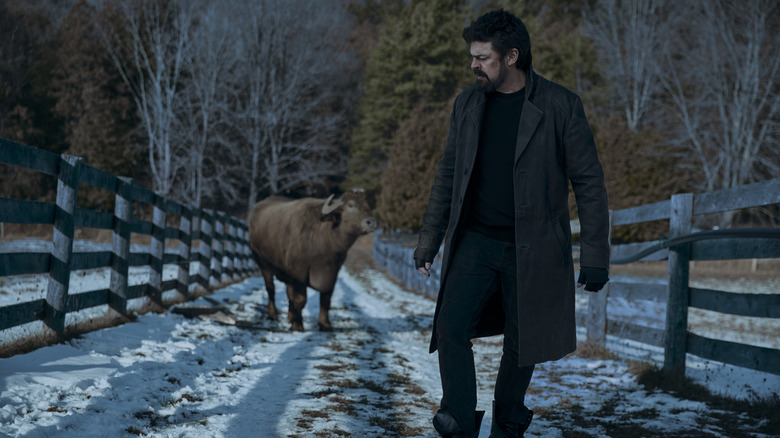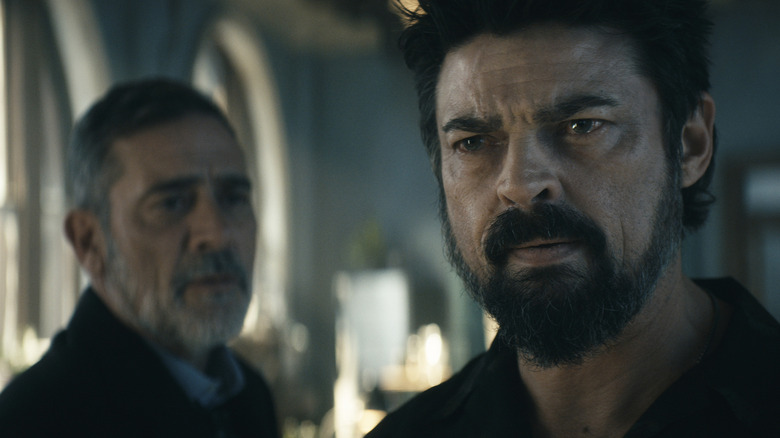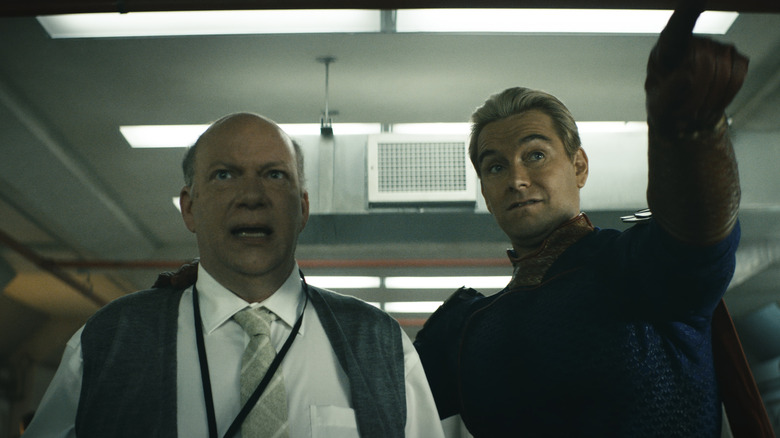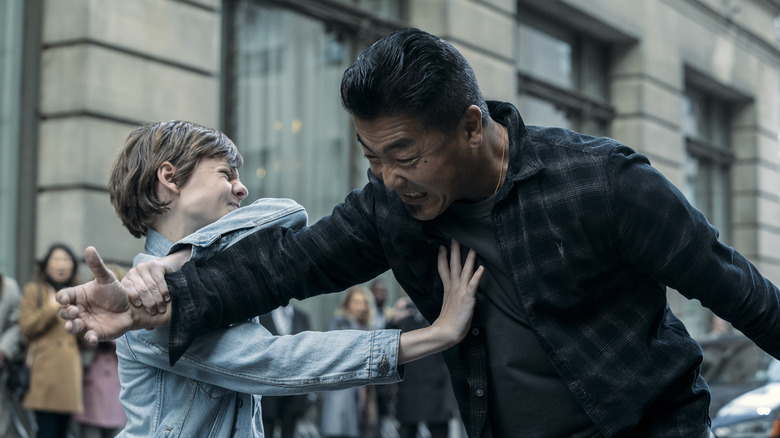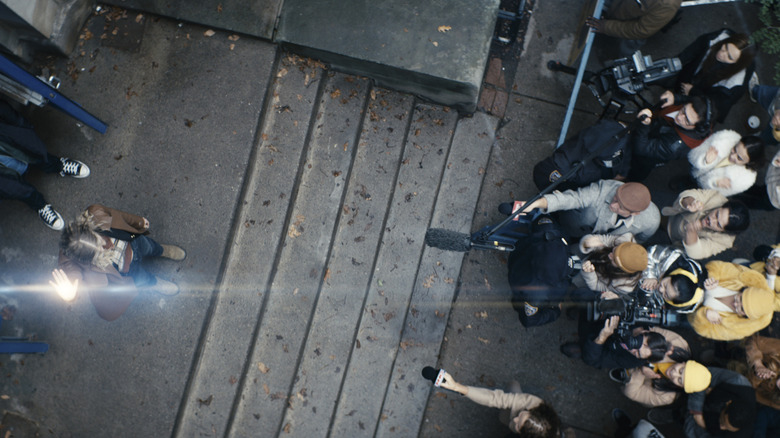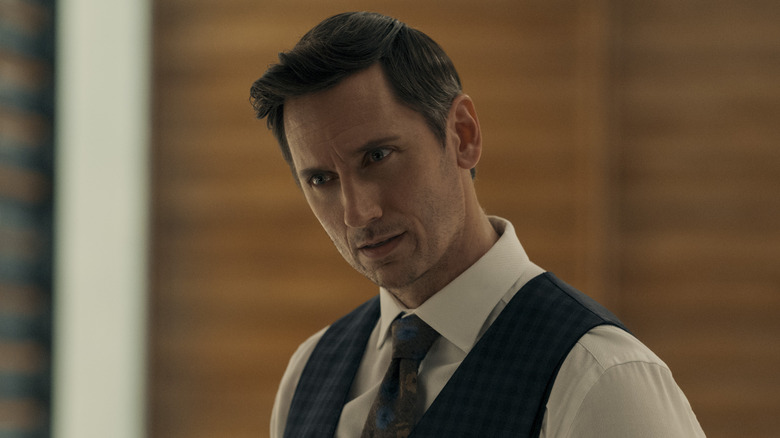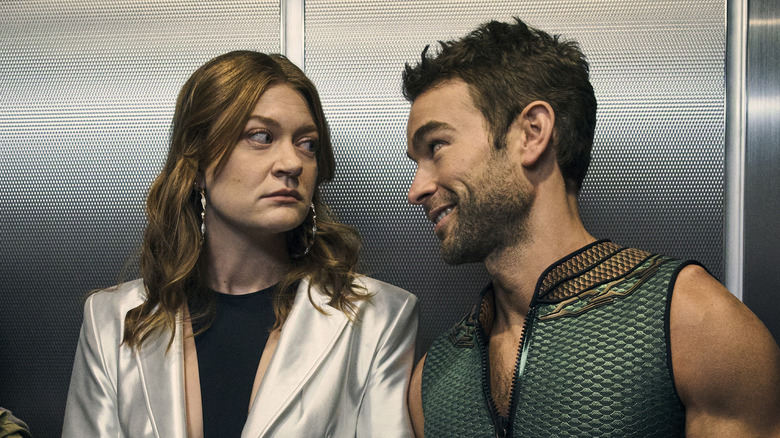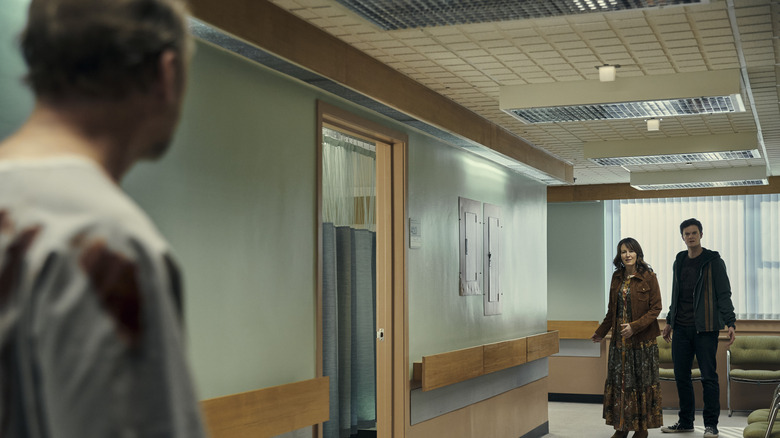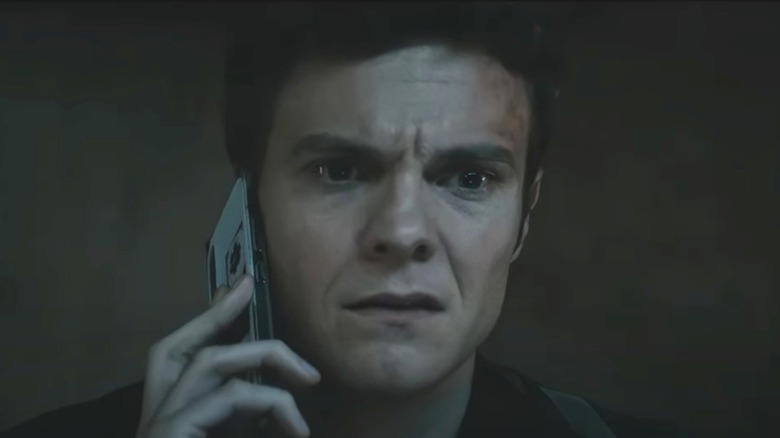The Most Controversial Moments Of The Boys Season 4
Contains spoilers for "The Boys" Season 4
"The Boys" has always been the most diabolical superhero show on television, but it's never been quite as audacious — and, in some ways, genuinely repugnant — as it was in Season 4. Certain "fans" of the series who likely describe themselves as "anti-woke" were apparently and perplexingly offended by its skewering of former U.S. president and current Republican presidential nominee Donald Trump — despite the series openly mocking him as well as the entirety of the American political spectrum for five years at this point.
But while complaints about the series suddenly "going woke" are embarrassingly hollow, there are real reasons why Season 4 of "The Boys" is arguably the series' most controversial. From shocking plot twists and gags that push the envelope to questionable story choices and moments that test the limits of even the most forgiving fan, Prime Video's latest foray into the Vought Cinematic Universe will surely be remembered as its most divisive.
We've sorted through the guts and gore to assemble the moments we feel are responsible for setting Season 4 apart from previous entries in the series, ranking them from least to most controversial. And whether "The Boys" and/or its fans wear these as marks of shame or badges of honor, we still can't wait to see what twists are in store for the show's fifth and final season.
Butcher's new superpowers are a downgrade
To kick things off, we're going to jump ahead to one of the final twists of "The Boys" Season 4. Seemingly inches away from death (via the Temp V tumor growing in his brain) and losing both his sanity and what little faith he had in saving the world the "right" way, Billy Butcher (Karl Urban) makes the 11th-hour call to ambush The Boys' clandestine meeting with Vice President Victoria Neuman (Claudia Doumit) so that he can personally assassinate her with his brand new superpowers. While Season 3 revealed that injecting a temporary strain of Compound V into his system would grant him heat vision, super strength, and enhanced durability, he can now produce gross-looking tendrils strong enough to tear a human in half.
Some fans may understandably be disappointed by Butcher swapping out his Homelander-esque powers, especially for one that may contribute to the show's Compound V-related plot holes, while feeling like it's coming out of left field at first. But as explained about the ending of "The Boys" Season 4, these powers might not technically be coming from Butcher, but his tumor — similar to the powers seen in "The Boys Presents: Diabolical" Season 1, Episode 7, "John and Sun-Hee." If so, Butcher's new powers make perfect sense, with their inclusion being a fascinating piece of world-building graciously adapted from the animated series.
The Deep's descent is sad for all the wrong reasons
Part of what makes Chace Crawford's performance on "The Boys" so underrated is that he makes you root for The Deep. Especially in Season 1, his performance — in concert with the show's writing — made it seem plausible that one of the most loathsome characters on TV right now could see redemption at some point in the future. Sadly, with a rather sharp and borderline confusing right turn in Season 4, this subversive potential storyline has seemingly gone out the window.
From fish to people, The Deep's arc for the majority of the past three seasons has largely concerned him confronting how his pathological need to be in The Seven devastates not only his chances at true fulfillment, but the lives of those closest to him. Yet — as telegraphed toward the end of Season 3 — this need has evolved into an equally pathological devotion to Homelander (Antony Starr). It no longer seems as though he's driven by "deep" insecurity, but by an insecure desire to please and emulate his idol.
Though this isn't necessarily a complete 180 for the character, Homelander feels retroactively established as The Deep's role model at this point — and it doesn't help that his murderous turn retreads dramatic ground Homelander already covered a while back. That said, the new arc is an amusing commentary on the online sycophantic "Alpha Male" hero-worship found in the likes of Andrew Tate fans.
Butcher goes down the comic book route
Prime Video's "The Boys" has been regularly praised for the changes it's made from the original comics. As much of an impact as the book made, it's generally considered to be too edgy for modern tastes, and features several characters far too offensive for live-action. Even aside from appeasing current cultural sensitivities, it was exciting for fans and detractors alike to experience an entirely new take on these characters and themes on the screen.
Unfortunately for those who feel this way, it appears as though Prime Video's "The Boys" is careening toward the comic book series' ending — complete with Butcher's psychopathic turn. With his murder of Neuman and commandeering of the enhanced supe-killing virus, it's only a matter of time before Hughie (Jack Quaid) is forced to confront him in a similar fashion to the final issues of the original story.
The difference, however, is that Butcher was already seemingly headed in a completely different direction. In Season 1, he wanted to avenge Becca's (Shantel VanSanten) death — a goal subverted by the revelation of her survival and ultimate death at the hands of Ryan (Cameron Corvetti) rather than Homelander. At this point, without getting him on board with The Boys' plans to save the world, his motivations can't be distilled beyond vague nihilistic vengeance and likely insanity, two attributes which can only carry such a dramatic shift so far before it begins to feel frustratingly weightless.
The Fight Club twist we saw a mile away
The big twist of "The Boys" Season 4 also comes to us courtesy of Butcher's fractured psyche. For the majority of the season, he works not with The Boys (who are now under the leadership of Laz Alonso's Mother's Milk) but with CIA officer Joe Kessler, the much-hyped character played by Jeffrey Dean Morgan. There was so much intrigue surrounding Morgan's mysterious role that people began speculating whether he could be the season's overarching antagonist in the form of Tek Knight. Instead, he was essentially a plot device, designed around a twist so basic that fans figured it out weeks before the show had a chance to stick the landing.
Yes, Kessler was a vivid figment of Butcher's imagination the entire time, in a surprisingly self-satisfied example of one of the most worn-out tropes in drama. Frustrating predictability aside, the twist's function in the story works fine. Because Kessler is inside his brain, Butcher is finally forced to confront a side of himself he's presumably been burying since Becca asked him to take care of Ryan with her dying breath — though again, this narrative seems to be taking Butcher back several steps rather than push him forward in ways we haven't yet seen.
Homelander tortures his torturers
"The Boys" has always enjoyed finding ways to kill off characters that are equal parts disgusting and creative — especially when the writers seemingly believe a character deserves such a fate. Supersonic (Miles Gaston Villanueva), the altruistic friend of Erin Moriarty's Starlight, got a sudden, but dignified off-screen death at the hands of Homelander; "Gen V" crossover Golden Boy (Patrick Schwarzenegger) exploded in the clouds; and even Black Noir (Nathan Mitchell) and Lamplighter (Shawn Ashmore) got respectable ends after receiving tragic backstories the episode before (the same treatment seems to be on the way for Jessie T. Usher's A-Train next season).
But when it comes to less favorable characters — from Translucent (Alex Hassell) and Stormfront (Aya Cash) to Tek Knight (Derek Wilson) and Webweaver (Dan Mousseau) — the deaths tend to be messier and/or more humiliating. Undeniably the most disturbing example of this comes in the Season 4 episode "Wisdom of the Ages," in which Homelander returns to the lab where he was raised to torture and eventually kill his former captors.
But as horrible as the acts Homelander remembers are, none of them are able to make a scene of a terrified man attempting to masturbate funny, cathartic, or even heartbreaking. Instead, as one might expect, the scene is cringe-inducing in all the wrong ways — especially as the series continues a disturbing trend of presenting sexual violence against men (which this scene is, no matter how vile the character on the receiving end is written to be) as dark humor.
Ryan's accidental killing spree continues
Of the changes made for Prime Video's "The Boys," the biggest was arguably turning the unnamed spawn of Homelander from the comics into Ryan Butcher, an actual character with recognizable emotions and a complex relationship to the world around him. In many ways, the TV series is written around Ryan and his struggle at the center of two worlds that want to claim him as their own. Season 4 begins with Homelander grooming him to be the next savior of the world, teaching him all the ways that Supes are special — and, more importantly, that humans are not.
As the season comes to a close, Ryan is confronted with the true motivations of his alternative, Butcher. Because Homelander is hellbent on turning the country — and possibly the world — into a fascist Supe empire, Butcher can't just stand by and let Ryan make his own choices. Whether Ryan stays with his biological dad (a genocidal fascist) or leaves to train with his adopted dad (a genocidal anarchist), the pressure to use his powers for "good" continues to mount. This, sadly, manifests in two more accidental murders, bringing Ryan's total accidental kill count to three.
Aside from the fact that it's becoming predictable at this point, continuing to have Ryan kill people by accident robs him of the opportunity to reflect on what should be traumatic experiences and make better choices. In other words, it keeps Ryan from growing as a character while making it harder to root for him.
Violence is never the answer -- except when it is
Obviously, violence in the real world is almost always unjustifiable, except perhaps in the most extreme, existentially dangerous circumstances — the kinds of circumstances "The Boys" deals with every season. This, in tandem with the fact that the series indulged in the most obnoxious, over-the-top scenes of violence imaginable, makes Hughie's final plea for peace at the end of Season 4 ring incredibly hollow.
On the surface, one could argue that Hughie is simply stating that, in this specific moment, flipping Neuman to their side makes more sense strategically than killing her. But the tone and content of his speech sounds like his thesis statement for the series' impending final moments — no matter how bad the villains get, we cannot resort to their level through violence. Given how lacking in conflict the scene is and how hilariously uncritical his team members are in the aftermath, this appears to be the show's thesis statement as well.
The problem is that the show constantly presents fantastically horrible scenarios where violence is actually very much necessary. How exactly do Hughie and The Boys plan to non-violently resolve a situation in which the U.S. government is actively aiding and abetting Homelander's fascist agenda? Will they vote out the entire presidential line of succession? Boycott Vought as its employees are massacred? At a time when Butcher's own genocidal urges desperately need countering, Hughie's perspective is painfully thin.
Tek Knight is pure wasted potential
Let's be clear — Derek Wilson is a wonderful actor, and his portrayal of Tek Knight as a perverted, privileged billionaire was appropriately creepy and effective on some level as a parody of Bruce Wayne. But for one of the series' most anticipated additions to the cast and the analog to both Batman and Iron Man, the character never really got a chance to shine.
Admittedly, fans (us included) do share some blame for over-hyping the character in the first place, to the point that we automatically assumed Jeffrey Dean Morgan would be doing his best Robert Downey Jr. impression for Season 4. Showrunner Eric Kripke even acknowledged back when the character was first announced as part of "Gen V" that he had never intended to feature Tek Knight as prominently as he was in the comics, as the show didn't have the budget for his Iron Man-esque suit of armor. Writer Jessica Chou ultimately pitched him as the straightforward super-detective we saw in the spin-off and Season 4.
But a depowered, more cerebral Tek Knight could have still played a larger, more dangerous role in "The Boys," rather than be reduced to a clumsy hodgepodge of fetish jokes before being unceremoniously written off a few episodes later. With such unique powers and an even more unique place in "The Boys" universe, it just feels as though Tek Knight had more to offer.
Everyone takes Compound V now
If there was one major point to Season 3, it was that — while there are some good superheroes — taking Compound V willingly in any form is a bad idea that imputes weak judgment, character, and core values. The story drove this point so far home that they gave Butcher a death sentence because of it.
So if both the audience and the characters now understand that the one line they do not cross is taking Compound V, why are Hughie and Annie suddenly ready to inject the stuff into the veins of Hughie's dying father? Yes, it would be tragic if Hugh Campbell Sr. (Simon Pegg) passed away, but why on earth would Hughie think for a second about subjecting his father to the same chemical dangers he himself learned to reject over the course of the last season.
Even more than diminishing the impact of Season 3's Temp V arc, having Compound V be so readily available to characters like Ashley Barrett (Colby Minifie) cheapens its value as a plot device. Barrett — one of the few remaining human characters on the opposing team that the audience is actively invested in — didn't have a more interesting arc available to her this season than turning herself into a giant monster. This undermines her very presence in the show, as well as any notion that "The Boys" is a meaningful deconstruction of the superhero genre rather than yet another cog within it.
Hughie's dad's send-off is horrifying
Hugh Sr. taking Compound V was another perplexing plot turn that sprinted in an off-putting direction without much build-up. With Hughie unable to let his father go, he quasi-indirectly gets him injected with Compound V via his estranged mother (Rosemarie Dewitt). Though Hugh Sr. at first seems to regain his vigor and make a full recovery, his brain quickly and clearly begins to deteriorate as the V grants him phasing powers he has no hope of controlling. The whole sequence plays out like a superhero spin on watching a loved one deal with dementia or Alzheimer's — confusion, rage and all.
It's a painful episode to watch, especially if you've lost someone close to you to a degenerative brain disease, which is arguably something of a credit to the show's writers. But whatever reality this bizarre scenario can miraculously emulate is hindered by the decision to say goodbye to Hughie's father in such a morbid way.
Yes, it's "The Boys," the edgiest show on television, but does that really make a solid case for having one of the few likable characters left tear through a hospital full of innocent people before dying anyway? Perhaps this would have been more compelling if Hugh had actually made the choice to inject his father with V himself, if there was some fallout from the violence, or if there was literally anything resembling choices and consequences here. Without them the episode is just edgy for the sake of being edgy.
Hughie's assault is played for laughs
The uncomfortable truth is that Eric Kripke's "The Boys" has always had a huge blind spot when it comes to sexual violence against non-female-identifying characters. From Doppelgänger deceiving and coercing a senator into sex (and himself later being coerced into performing sex acts on Homelander) to The Deep being assaulted at the end of Season 1, every scene that places these characters in either unwanted sexual scenarios or actual sexual danger is portrayed as dark shock-comedy. These scenes (perhaps with the exception of The Deep's) aren't there to make the audience reflect on the prevalence of sexual violence in American culture — they're supposed to make us gasp and, ideally, laugh.
If you don't believe us, look no further than how Kripke himself responded when he found out fans were furious over Hughie being subjugated to hours of extreme sexual torture without consent. He told Variety that he and the creative team thought the scene was "hilarious," before adding, "I love that it's just such a perfect setup that he doesn't know his own safe word. It's just like a beautiful comedy setup that he's trying to find it the whole time." Though "The Boys" is often great at social commentary, sexual assault is one area where the show's affection for controversy ruins the potential for discourse entirely.
If you or anyone you know has been a victim of sexual assault, help is available. Visit the Rape, Abuse & Incest National Network website or contact RAINN's National Helpline at 1-800-656-HOPE (4673).
